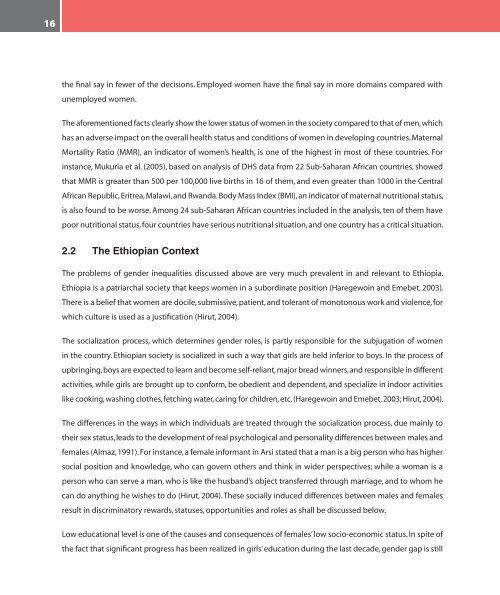Gender Inequality and Women's Empowerment - UNFPA Ethiopia
Gender Inequality and Women's Empowerment - UNFPA Ethiopia
Gender Inequality and Women's Empowerment - UNFPA Ethiopia
Create successful ePaper yourself
Turn your PDF publications into a flip-book with our unique Google optimized e-Paper software.
16<br />
In-depth Analysis of the <strong>Ethiopia</strong>n Demographic <strong>and</strong> Health Survey 2005<br />
the final say in fewer of the decisions. Employed women have the final say in more domains compared with<br />
unemployed women.<br />
The aforementioned facts clearly show the lower status of women in the society compared to that of men, which<br />
has an adverse impact on the overall health status <strong>and</strong> conditions of women in developing countries. Maternal<br />
Mortality Ratio (MMR), an indicator of women’s health, is one of the highest in most of these countries. For<br />
instance, Mukuria et al. (2005), based on analysis of DHS data from 22 Sub-Saharan African countries, showed<br />
that MMR is greater than 500 per 100,000 live births in 16 of them, <strong>and</strong> even greater than 1000 in the Central<br />
African Republic, Eritrea, Malawi, <strong>and</strong> Rw<strong>and</strong>a. Body Mass Index (BMI), an indicator of maternal nutritional status,<br />
is also found to be worse. Among 24 sub-Saharan African countries included in the analysis, ten of them have<br />
poor nutritional status, four countries have serious nutritional situation, <strong>and</strong> one country has a critical situation.<br />
2.2 The <strong>Ethiopia</strong>n Context<br />
The problems of gender inequalities discussed above are very much prevalent in <strong>and</strong> relevant to <strong>Ethiopia</strong>.<br />
<strong>Ethiopia</strong> is a patriarchal society that keeps women in a subordinate position (Haregewoin <strong>and</strong> Emebet, 2003).<br />
There is a belief that women are docile, submissive, patient, <strong>and</strong> tolerant of monotonous work <strong>and</strong> violence, for<br />
which culture is used as a justification (Hirut, 2004).<br />
The socialization process, which determines gender roles, is partly responsible for the subjugation of women<br />
in the country. <strong>Ethiopia</strong>n society is socialized in such a way that girls are held inferior to boys. In the process of<br />
upbringing, boys are expected to learn <strong>and</strong> become self-reliant, major bread winners, <strong>and</strong> responsible in different<br />
activities, while girls are brought up to conform, be obedient <strong>and</strong> dependent, <strong>and</strong> specialize in indoor activities<br />
like cooking, washing clothes, fetching water, caring for children, etc. (Haregewoin <strong>and</strong> Emebet, 2003; Hirut, 2004).<br />
The differences in the ways in which individuals are treated through the socialization process, due mainly to<br />
their sex status, leads to the development of real psychological <strong>and</strong> personality differences between males <strong>and</strong><br />
females (Almaz, 1991). For instance, a female informant in Arsi stated that a man is a big person who has higher<br />
social position <strong>and</strong> knowledge, who can govern others <strong>and</strong> think in wider perspectives; while a woman is a<br />
person who can serve a man, who is like the husb<strong>and</strong>’s object transferred through marriage, <strong>and</strong> to whom he<br />
can do anything he wishes to do (Hirut, 2004). These socially induced differences between males <strong>and</strong> females<br />
result in discriminatory rewards, statuses, opportunities <strong>and</strong> roles as shall be discussed below.<br />
Low educational level is one of the causes <strong>and</strong> consequences of females’ low socio-economic status. In spite of<br />
the fact that significant progress has been realized in girls’ education during the last decade, gender gap is still


